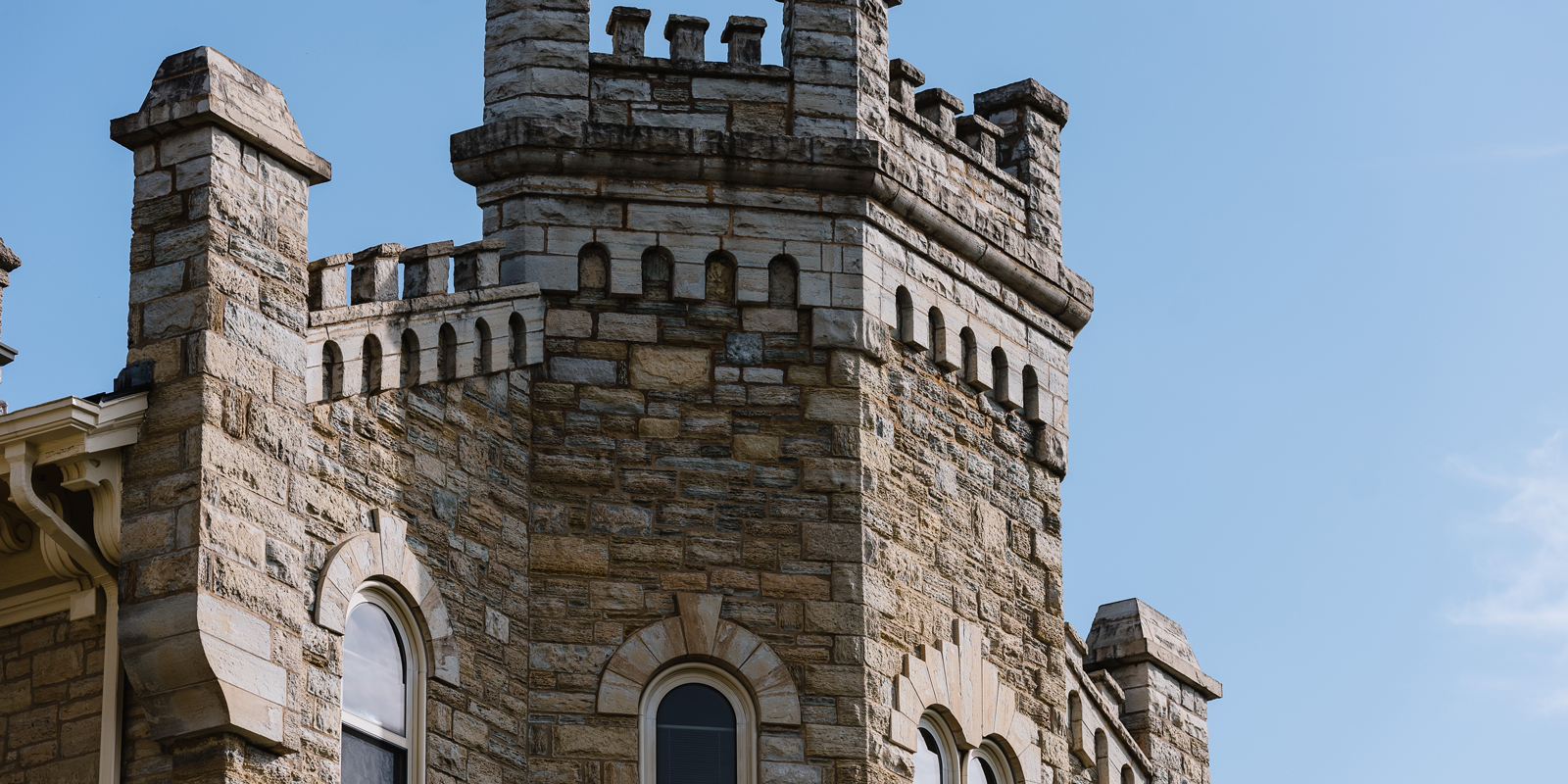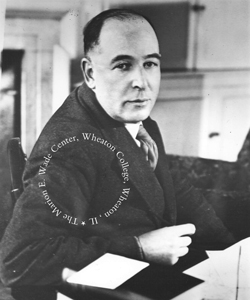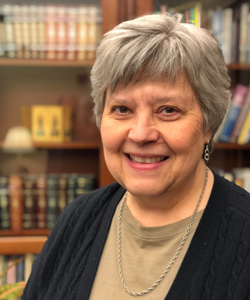May 20, 2020
Marjorie Lamp Mead, Associate Director of the Marion E. Wade Center, provides encouragement from the thoughts of C. S. Lewis, who was no stranger to difficult times.

“The great thing is to be found at one's post as a child of God, living each day as though it were our last, but planning as though our world might last a hundred years.” - C.S. Lewis, “Cross-Examination” in God in the Dock
“Trust in the Lord with all thine heart, and lean not unto thine own understanding. In all thy ways acknowledge Him, and He shall direct thy paths.” - Proverbs 3:5-6 (KJV)
On October 22, 1939, C.S. Lewis delivered an Evensong message to the students and faculty at Oxford University. These were still the early days of World War II, but having served in the trenches of France during the First World War, Lewis understood only too well the horror of what these young undergraduates were facing. Indeed, the likelihood that the majority of them would not survive the war was all too probable. Given this context, perhaps some will find it surprising that rather than stir these students to courageous action or even attempt to strengthen them as they looked towards the unknown future, Lewis instead chose to talk about the importance of living the life they were currently pursuing, with integrity and dedication, as long as circumstances permitted.
In this case, as members of the University, they were called at this particular moment to the pursuit of knowledge, no matter that their own future remained uncertain. As Lewis explained, “I think it important to try to see the present calamity in a true perspective. The war creates no absolutely new situation: it simply aggravates the permanent human situation so that we can no longer ignore it. Human life has always been lived on the edge of a precipice. . . . We are mistaken when we compare war with ‘normal life’. Life has never been normal. Even those periods which we think most tranquil . . . , turn out, on closer inspection, to be full of crises, alarms, difficulties, emergencies.”
What Lewis is saying here was not intended to be dismissive of the stark situation that all of them were facing, rather he was reminding them that every one of us lives each day in a world of uncertainty. Circumstances, such as war or a pandemic, do not create a new reality; they simply bring the actual reality home more forcefully. The truth remains, that whether our outward circumstances appear to be calm or whether we are being buffeted in the midst of a storm, we are still mortals living in a fallen world subject to numerous things apart from our control.
Today, we face different circumstances with the spread of this pandemic, but nonetheless, a similar reality. As we experience our own battle with societal upheaval on a global scale along with considerable suffering and significant loss of life that few of us have ever known firsthand, it is difficult not to be overwhelmed. How do we best deal with this sobering reality? Lewis offers wise counsel for this challenge.
 First of all, Lewis reassures us that fear and anxiety are a normal human reaction to times of great stress, reminding us that “No man—and specially no Christian who remembers Gethsemane—need try to attain a stoic indifference about these things.” However, this does not mean that we are left alone to cope with our distress. Rather, to quote Lewis once again, “A more Christian attitude, which can be attained at any age, is that of leaving futurity in God’s hands. We may as well, for God will certainly retain it whether we leave it to him or not. Never, in peace or war, commit your virtue or your happiness to the future. Happy work is best done by the man who takes his long-term plans somewhat lightly and works from moment to moment ‘as to the Lord’. It is only our daily bread that we are encouraged to ask for. The present is the only time in which any duty can be done or any grace received.”
First of all, Lewis reassures us that fear and anxiety are a normal human reaction to times of great stress, reminding us that “No man—and specially no Christian who remembers Gethsemane—need try to attain a stoic indifference about these things.” However, this does not mean that we are left alone to cope with our distress. Rather, to quote Lewis once again, “A more Christian attitude, which can be attained at any age, is that of leaving futurity in God’s hands. We may as well, for God will certainly retain it whether we leave it to him or not. Never, in peace or war, commit your virtue or your happiness to the future. Happy work is best done by the man who takes his long-term plans somewhat lightly and works from moment to moment ‘as to the Lord’. It is only our daily bread that we are encouraged to ask for. The present is the only time in which any duty can be done or any grace received.”
The theme of appropriately focusing on the present is found throughout Lewis’s writings. For example, in The Screwtape Letters, written during WWII, he emphasizes the importance of accepting “with patience the tribulation which has actually been dealt out to [us]” rather than imagining what might possibly occur. This was not glib advice on the part of Lewis nor was he personally untouched by suffering. In fact, in his own life, he faced many significant challenges with the earliest being the death of his mother when he was just a young boy of nine. There were other great hardships as well including the ordeal of his war experience, the sorrow of his brother Warren’s long struggle with alcoholism, the deterioration of his “adopted” mother, Mrs. Moore, into dementia, and finally the death of his American wife Joy from cancer following their brief, but very happy marriage.
In what ways did these traumatic experiences influence Lewis? One helpful insight is offered in this poignant reflection from his autobiography, Surprised by Joy: “With my mother’s death all settled happiness, all that was tranquil and reliable, disappeared from my life. There was to be much fun, many pleasures, many stabs of Joy; but no more of the old security.” During these difficult days as we struggle to adjust to the tremendous disruption caused by COVID-19, we may find ourselves resonating with Lewis’s words on the loss of a sense of safety -- or as he put it, we may discover that we have “no more of the old security.”
So, where does that leave us? How do we find firm footing, if we can no longer count on the world around us to be a place of relative safety? Turning to Lewis once again, we find that he encourages us to realize that this very uncertainty can be a blessing if it causes us to depend upon God more fully. Well and good, we may think, but how do we accomplish that? How do we learn to trust in the midst of uncertainty? In his classic work Mere Christianity, while discussing the meaning of faith, Lewis advises, “There are a great many things that cannot be understood until after you have gone a certain distance along the Christian road.” He then goes on to confess that at a certain point in his own Christian life, after much effort and resultant failure, he found himself admitting to God, “You must do this. I can’t.” Surprisingly, this acknowledgment of our weakness is actually good news, he explains, since an explicit acceptance of our own failure is the very thing that enables us to make “the change from being confident about our own efforts to the state in which we despair of doing anything for ourselves and leave it to God.”
However, to most of us at this moment, this may not sound like the good news we were hoping for: truly, why should we rejoice at finding ourselves weak and inadequate? Listen to these words from our Lord in the opening verse of the beatitudes (Matthew 5:3): “Blessed are the poor in spirit, for theirs is the kingdom of heaven.” Throughout the Beatitudes, Jesus turns our human logic upside down, as He offers a very different viewpoint than the one we invariably receive from secular culture. In this verse, the most common reading of “poor in spirit” is to understand it as meaning “humble” – certainly, not a trait our own world values highly when most individuals strive instead for positions of power, wealth, and even celebrity status. A less traditional rendering of this verse by Eugene Peterson in his version The Message offers additional perspective: “You're blessed when you're at the end of your rope. With less of you, there is more of God and his rule.”
The encouragement that “you’re blessed when you’re at the end of your rope” is exactly what Lewis is attempting to share with us. Indeed, this crucial turning point in his own faith journey came about when he quit relying solely upon his own futile efforts and instead began to trust more deeply in God’s care for him. In The Gift of Being Yourself (IVP), Christian psychologist, David G. Benner shares his understanding of this same difficult yet essential process of learning to trust divine love:
“Coming to know and trust God’s love is a lifelong process. Making this knowledge the foundation of our identity—or better, allowing our identity to be re-formed around this most basic fact of our existence—will also never happen instantly. Both lie at the core of the spiritual transformation that is the intended outcome of Christ-following. Every time I dare to meet God in the vulnerability of my sin and shame, this knowing is strengthened. Every time I fall back into a self-improvement mode and try to bring God my best self, it is weakened. I only know Divine unconditional, radical and reckless love for me when I dare to approach God just as I am. The more I have the courage to meet God in this place of weakness, the more I will know myself to be truly and deeply loved by God. And the more deeply I know this love, the easier it will be to trust it as Christ did—preferring God’s will to my own.”
Like Lewis, Benner identifies that coming to God with a willingness to acknowledge our sin and failures, and saying to God (in Lewis’s words), “You must do this. I can’t”, is a key first step in the process of our learning to trust. However, it is important to note that the act of trusting and thereby leaving things in God’s hands, did not mean that Lewis was proposing a life of passivity. To the contrary, he understood that genuine trust must always lead to obedient actions. Thus, far from advising that we abdicate action, Lewis believed instead that we must experience a change in attitude from one of self-reliance to one of profound trust in God in all that we do.
During the uncertain days of WWII, part of Lewis’s own call to action was his willingness to give talks on the Christian faith over the BBC radio. These important talks would later be gathered into the single volume that we know as Mere Christianity. More than we might realize today, these broadcasts involved both the hardship of wartime travel as well as the hazards of being in war-torn London. These radio talks were not Lewis’s only actions in support of the British people during these years, but they were among his most courageous, for there was a strong expectation that the Nazis would eventually invade England as they already had done in countries throughout most of Europe. If this invasion had been successful, Lewis and others who were outspoken on behalf of the Christian faith believed it likely that they would have been imprisoned in concentration camps. (For example, Dorothy Sayers wrote to her son in June 1940, “In the event of a German occupation of this country, which is possible, though I think not probable, be careful not to advertise your connection with me; writers of my sort will not be popular with the Gestapo.”) Thus it was, in spite of significant reason to fear, Lewis continued to act in obedience, doing what was needed to help others, aided by his deepening trust in God.
In spite of these gravely uncertain times, we who follow the Risen Lord rejoice in the certainty of His love and care for us, no matter the tumult of external circumstances. In closing, I offer, with permission, these powerful words from Anglican poet and theologian, Malcolm Guite, who speaks confidently of the reality that Jesus is truly with us this very day, bringing His promised light into the darkness of our world. May we all be emboldened to place our trust, not in our own frail abilities, but rather in the strong presence of Jesus, our Savior and Lord.
“Easter 2020”
Malcolm Guite
And where is Jesus, this strange Easter day?
Not lost in our locked churches, anymore
Than he was sealed in that dark sepulchre.
The locks are loosed; the stone is rolled away,
And he is up and risen, long before,
Alive, at large, and making his strong way
Into the world he gave his life to save,
No need to seek him in his empty grave.
He might have been a wafer in the hands
Of priests this day, or music from the lips
Of red-robed choristers, instead he slips
Away from church, shakes off our linen bands
To don his apron with a nurse: he grips
And lifts a stretcher, soothes with gentle hands
The frail flesh of the dying, gives them hope,
Breathes with the breathless, lends them strength to cope.
On Thursday we applauded, for he came
And served us in a thousand names and faces
Mopping our sickroom floors and catching traces
Of that virus which was death to him:
Good Friday happened in a thousand places
Where Jesus held the helpless, died with them
That they might share his Easter in their need,
Now they are risen with him, risen indeed.
For those who are interested, a beautiful audio recording of “Easter 2020” read by the poet can be found on Malcolm Guite’s website.
 Marjorie Lamp Mead ‘ 74 is Associate Director of the Marion E. Wade Center, the foremost archive in the world for published and unpublished works by and about C.S. Lewis and six of his important Christian influencers. This piece was originally written as a special devotional for members of The Blanchard Society, which is an honorary group of people who have remembered Wheaton College in their estate plans.
Marjorie Lamp Mead ‘ 74 is Associate Director of the Marion E. Wade Center, the foremost archive in the world for published and unpublished works by and about C.S. Lewis and six of his important Christian influencers. This piece was originally written as a special devotional for members of The Blanchard Society, which is an honorary group of people who have remembered Wheaton College in their estate plans.